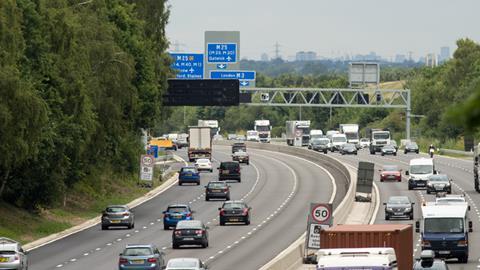A new research hub will use digital twins to help determine how transport systems, including logistics supply chains, can be decarbonised as quickly, safely and cheaply as possible.
The TransiT Hub, led by Heriot-Watt University and the University of Glasgow, is supported by a £46m investment from the Engineering and Physical Sciences Research Council (EPSRC) and 67 partners.
It will use digital replicas of the physical world , known as digital twins, to collect data in real time via sensors connected to infrastructure such as roads, railways or shipping.
The real-world data will be analysed to test and improve different scenarios, and the digital twin can then send back its solution for an improved process to the physical world in near real-time.
The Hub will also use the data to test how parts of a future decarbonised transport system work, such as electric road systems and alternative fuels.
By speeding up the way new systems are tested it will also help to identify the lowest-cost pathways to net zero carbon emissions. One of its goals is to help logistics companies identify the most sustainable routes, vehicle types and journey times.
Data to build the digital twins will come from TransiT’s industry partners, including the number and type of vehicles, fuel types, load sizes, length and frequency of routes.
The partners, who are providing £26m in funding support, come from across the digital, energy and transport sectors,and include the RHA, transport operators and vehicle manufacturers.
The collaboration is thought to be one of the largest transport consortiums of its kind.
RHA welcomed the intiative this week. Chris Ashley, RHA lead for the environment, said: “We strongly welcome the TransiT initiative. Cutting emissions is essential as we focus on net zero, and it’s vital we have a clear understanding over how this is achieved sustainably.
“This innovative work by Transit to pioneer digital twinning to replicate and model the physical world will inform our knowledge and, in turn, the investments needed.”
Transport Minister Mike Kane added: “Digital twinning is a powerful technology that can help us integrate transport networks, improve efficiency and deliver greener transport for all.
“The launch of TransiT is an important step which will bring together academia, industry and government to research and realise the benefits of this technology for the transport sector. This is an excellent example of the work being done across government to deliver true innovation.”
Professor Charlotte Deane, EPSRC executive chair, said: “Digital twins offer an enormous opportunity to decarbonise our transport networks by testing the potential impact of changes more quickly, reducing costs and helping us to design the transport networks we need, when we need them.
“Passengers and commuters will benefit through being able to choose the most sustainable travel choices, while transport operators will be able to speed up their work to provide low-carbon services.
“TransiT is the result of considerable work between UKRI and government to identify how we can best harness the expertise of a wide range of partners across academia, industry and other organisations to ensure that we seize the opportunities digital twins offer.”
TransiT joint director Professor Phil Greening, of Heriot-Watt University, said: “Transport accounts for about a third of UK carbon emissions and, with global temperatures rapidly rising, we have run out of time to carry out real world transport trials and learn from them.
“So, if the UK is to meet its carbon reduction commitments, we have to do our experiments digitally. We need to design the future transport system and optimise the transition to it.
“Digital twins will help us see the where, what and how to decarbonise transport. We start by building individual models of real-world transport systems.
“These can then be connected together and linked to the real world to give a bigger picture of what our future decarbonised transport system might look like – and the lowest cost way of getting there.”
TransiT joint director Professor David Flynn, from the University of Glasgow, added: “We will explore how digital twinning can improve the design of future transport solutions, to ensure services are accessible to all.
“It’s challenging for designers and engineers today to appreciate the perspective of citizens with mobility challenges and what they experience throughout the full journey. If we can create and embed new design principles, we can identify equitable pathways to decarbonisation.”
The eight universities in TransiT include the University of Cambridge, which will specialise in road freight and will include the Centre for Sustainable Road Freight, a collaboration between the University of Cambridge, Heriot-Watt University, and the University of Westminster.

















